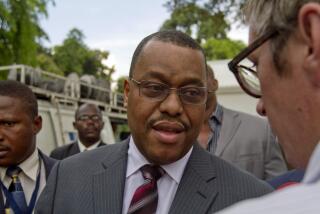Can an election heal Haiti?
Haitians will head to the polls Sunday to elect a new president who, it is hoped, will begin to pull the country out of its perennial state of misery. But the obstacles are substantial.
The impoverished Caribbean nation has been struggling to recover ever since a massive earthquake leveled much of it in January 2010. Today, millions remain homeless or living in tattered tents. A cholera epidemic has further crippled the already wounded nation.
Botched elections in November, marred by significant fraud, led to this month’s runoff, which will determine whether Michel Martelly, a popular musician, or Mirlande Manigat, a former first lady and academic, should lead the country. To complicate matters, two of Haiti’s most polarizing political figures have recently returned to the country, threatening to destabilize the runoff process and exacerbate Haiti’s political crisis.
On Friday, Jean-Bertrand Aristide, a former president who was twice elected and twice ousted from power, arrived from exile in South Africa. Even after seven years away, he remains extremely popular among poor Haitians, although others have criticized his administration as corrupt and abusive. Aristide’s return comes just two months after former dictator Jean-Claude “Baby Doc” Duvalier arrived from France. Duvalier, who was forced out of office 25 years ago, faces myriad human rights and corruption charges in a court system largely viewed as crooked and ineffective.
No individual can fix Haiti’s deep and pervasive problems, which have been shaped by a cruel colonial past, repeated foreign intervention, a lack of working institutions and widespread corruption. But Sunday’s vote is a test and an opportunity. Legitimate elections could help the country move out of the quasi-trusteeship it is currently under.
Whoever wins must quickly provide a concrete plan to international donors who have pledged more than $10 billion to help Haiti out of its current crisis. The plan should offer specific details for rebuilding cities and revitalizing the denuded countryside. It should focus on building schools and housing but should also encourage businesses that can help keep foreign investment in the country. Haiti’s next leader must also have a broader vision that includes building civil institutions and a functioning judicial system as well as badly needed basic infrastructure.
Those are tall orders for a country with as many problems as Haiti has. In the near term, we hope that Sunday’s vote will not be undermined by violence or low turnout, and that Haitians cast their ballots with an eye toward the future and ignore the political ghosts that have reemerged.
More to Read
A cure for the common opinion
Get thought-provoking perspectives with our weekly newsletter.
You may occasionally receive promotional content from the Los Angeles Times.










